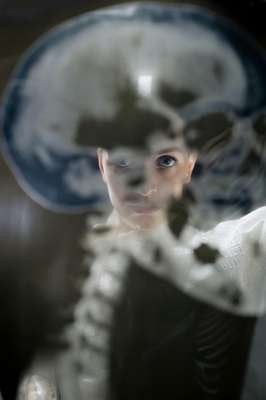Are You Wrongly Diagnosed With Dementia? Expert Revelations Suggest 1 in 10 Are!
By
Danielle F.
- Replies 1
The fear of dementia is a specter that looms large for many of us as we age. It's a condition that can strip away memories, personalities, and the ability to live independently. So, when a diagnosis is made, it's often met with a mix of dread and acceptance. But what if that diagnosis was wrong? According to recent expert analysis, this could be the case for more than one in ten people told they have dementia.
In a startling revelation, a study involving over 68,000 individuals diagnosed with dementia found that nearly 13 percent exhibited signs of a condition known as hepatic encephalopathy (HE), a brain impairment caused by liver cirrhosis. This condition, often a result of heavy drinking, obesity, or hepatitis, leads to the buildup of scar tissue in the liver, impairing its ability to filter toxins from the blood. These toxins can then accumulate and affect the brain, leading to symptoms that closely mimic those of dementia.
The symptoms of HE include confusion, forgetfulness, personality or mood changes, and changes in sleep patterns, all of which are also common in dementia patients. As HE progresses, it can lead to more severe symptoms such as shaky hands, extreme anxiety, and even seizures. However, unlike the progressive decline seen in dementia, HE can be completely reversed with appropriate treatment, which may include antibiotics and nutritional supplements.
The implications of these findings are profound. Thousands of individuals may have been misdiagnosed with an incurable disease when, in fact, they could potentially recover completely with the right medical intervention. Dr Jasmohan Bajaj, a Virginia-based gastroenterologist and the study's author, emphasizes the need for increased awareness that cirrhosis and related brain complications are common but treatable when identified.
Despite these findings, some British dementia specialists have expressed skepticism, pointing out that there are subtle differences between HE and dementia that trained doctors would typically recognize. They argue that the fluctuating symptoms of HE are distinct from the steady progression of Alzheimer's and other forms of dementia. Dr Rob Howard, Professor of Old Age Psychiatry at University College London, insists that physical causes for confusion should always be excluded before a dementia diagnosis is made, and this includes liver function tests.
The study's findings are particularly relevant given the aging population and the rising prevalence of dementia. In the UK, around one million people are living with dementia, a number expected to increase to 1.4 million by 2040. In the US, the Centers for Disease Control estimates that 5.8 million Americans have Alzheimer's disease and related dementias, with the majority being over the age of 65.
Dr Bajaj's research, which analyzed data from 72 US healthcare providers, also highlights the importance of using tools like the Fibrosis-4 (FIB-4) score, a common test for cirrhosis, to ensure that liver disease is not overlooked as a contributing factor in patients presenting with neurocognitive symptoms.
For our readers, this news serves as a reminder of the importance of thorough medical evaluations and the potential for misdiagnosis. If you or a loved one has been diagnosed with dementia, it may be worth discussing the possibility of HE with your healthcare provider, especially if there is a history of liver disease or related risk factors.

The journey of dealing with dementia is challenging enough without the added burden of a misdiagnosis. Let's ensure that we and our loved ones receive the correct diagnosis and the best possible care. Have you or someone you know experienced a similar situation? Share your stories and thoughts in the comments below, and let's continue the conversation about this critical issue.
In a startling revelation, a study involving over 68,000 individuals diagnosed with dementia found that nearly 13 percent exhibited signs of a condition known as hepatic encephalopathy (HE), a brain impairment caused by liver cirrhosis. This condition, often a result of heavy drinking, obesity, or hepatitis, leads to the buildup of scar tissue in the liver, impairing its ability to filter toxins from the blood. These toxins can then accumulate and affect the brain, leading to symptoms that closely mimic those of dementia.
The symptoms of HE include confusion, forgetfulness, personality or mood changes, and changes in sleep patterns, all of which are also common in dementia patients. As HE progresses, it can lead to more severe symptoms such as shaky hands, extreme anxiety, and even seizures. However, unlike the progressive decline seen in dementia, HE can be completely reversed with appropriate treatment, which may include antibiotics and nutritional supplements.
The implications of these findings are profound. Thousands of individuals may have been misdiagnosed with an incurable disease when, in fact, they could potentially recover completely with the right medical intervention. Dr Jasmohan Bajaj, a Virginia-based gastroenterologist and the study's author, emphasizes the need for increased awareness that cirrhosis and related brain complications are common but treatable when identified.
Despite these findings, some British dementia specialists have expressed skepticism, pointing out that there are subtle differences between HE and dementia that trained doctors would typically recognize. They argue that the fluctuating symptoms of HE are distinct from the steady progression of Alzheimer's and other forms of dementia. Dr Rob Howard, Professor of Old Age Psychiatry at University College London, insists that physical causes for confusion should always be excluded before a dementia diagnosis is made, and this includes liver function tests.
The study's findings are particularly relevant given the aging population and the rising prevalence of dementia. In the UK, around one million people are living with dementia, a number expected to increase to 1.4 million by 2040. In the US, the Centers for Disease Control estimates that 5.8 million Americans have Alzheimer's disease and related dementias, with the majority being over the age of 65.
Dr Bajaj's research, which analyzed data from 72 US healthcare providers, also highlights the importance of using tools like the Fibrosis-4 (FIB-4) score, a common test for cirrhosis, to ensure that liver disease is not overlooked as a contributing factor in patients presenting with neurocognitive symptoms.
For our readers, this news serves as a reminder of the importance of thorough medical evaluations and the potential for misdiagnosis. If you or a loved one has been diagnosed with dementia, it may be worth discussing the possibility of HE with your healthcare provider, especially if there is a history of liver disease or related risk factors.
Key Takeaways
- Over 10 per cent of individuals diagnosed with dementia may actually be suffering from hepatic encephalopathy (HE), a treatable liver condition.
- HE is caused by liver cirrhosis and can lead to symptoms similar to dementia, but unlike dementia, it can be reversed with appropriate treatment.
- The recent study highlights the need for increased awareness and consideration of HE as a potential cause or contributing factor to cognitive impairment in patients diagnosed with dementia.
- Experts urge that common diagnostics, such as liver function tests, should not be overlooked when assessing patients for dementia to avoid misdiagnosis.








